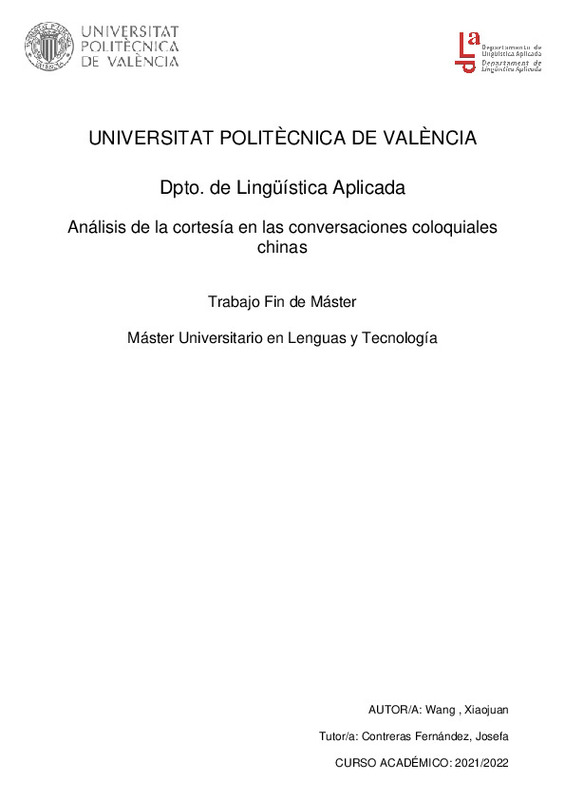|
Resumen:
|
[ES] Esta investigación pretende contribuir al estudio de la lingüística china examinando las estrategias de cortesía en el chino hablado y, en concreto, en la conversación coloquial. Nuestro objetivo general es averiguar ...[+]
[ES] Esta investigación pretende contribuir al estudio de la lingüística china examinando las estrategias de cortesía en el chino hablado y, en concreto, en la conversación coloquial. Nuestro objetivo general es averiguar qué estrategias utilizan los sinohablantes en las conversaciones entre familiares y amigos. Este objetivo se desglosa en los siguientes objetivos específicos, por una parte, clasificar las estrategias de cortesía utilizadas en estas conversaciones y, por otra parte, analizar la finalidad del uso de estas estrategias en los diferentes contextos conversacionales.
Para alcanzar los objetivos fijados y después de estudiar las investigaciones sobre la cortesía, se prepara un corpus que consta de 11 conversaciones coloquiales en chino, con una duración total de 15 minutos y 32 segundos. Las relaciones entre los interlocutores son de proximidad, es decir, son conversaciones entre familiares y amigos, los temas son cotidianos y la finalidad es interpersonal.
El análisis del corpus da como resultado 26 diferentes estrategias de cortesía utilizadas por los sinohablantes de nuestro corpus. El estudio muestra asimismo que el uso de estrategias de cortesía en las conversaciones coloquiales chinas de nuestro corpus tenía como finalidad respetar el estatus social, minimizar posibles amenazas, agradar la imagen del otro, hacer sentir bien a los demás , así como conseguir un objetivo, o mantener la armonía y una buena relación con los demás. Asimismo, se ha podido comprobar que las estrategias de cortesía empleadas por los hablantes de nuestro corpus se han utilizado como una forma de mantener las relaciones del grupo a partir del respeto mutuo.
[-]
[EN] This research aims to contribute to the study of Chinese linguistics by examining politeness strategies in spoken Chinese and, specifically, in colloquial conversation. Our general aim is to find out what strategies ...[+]
[EN] This research aims to contribute to the study of Chinese linguistics by examining politeness strategies in spoken Chinese and, specifically, in colloquial conversation. Our general aim is to find out what strategies Sino speakers use in conversations between family and friends. This objective is divided into the following specific objectives: to classify the politeness strategies used in these conversations and, to analyze the purpose of the use of these strategies in different conversational contexts.
In order to achieve the set objectives and after studying research on politeness, a corpus was prepared consisting of 11 daily conversations in Chinese, with a total duration of 15 minutes and 32 seconds. The relations between the interlocutors are close, i.e., conversations between family and friends, all topics are quotidian, and the purpose is interpersonal.
The analysis of the corpus yielded 26 different politeness strategies used by the Sino speakers in our corpus. The study also shows that the use of politeness strategies in Chinese colloquial conversations in our corpus was aimed at respecting social status, minimizing possible threats, flattering the face of the other, making others feel good, achieving the objectives, or maintaining harmony and a good relationship with others. It was also found that the Chinese politeness strategies employed by the speakers in our corpus were used as a way of maintaining group relations on the basis of mutual respect.
[-]
|







